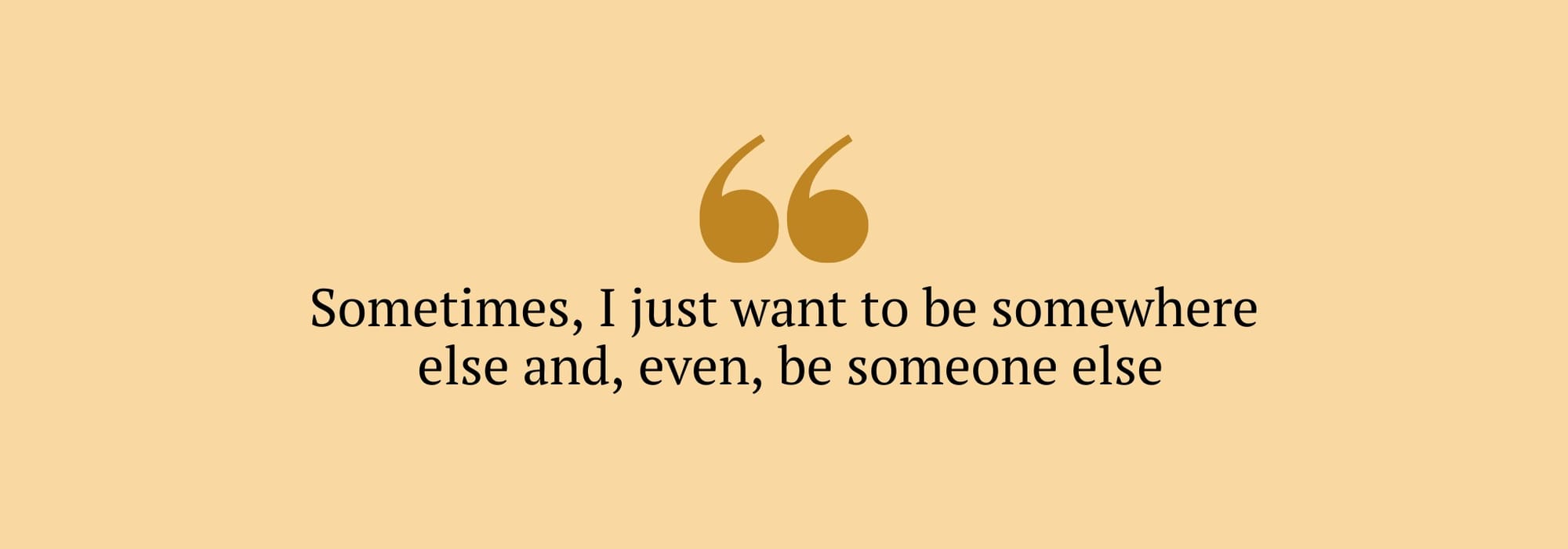If you’ve ever had the feeling that you need to just drop everything and bolt, there can actually be a logical explanation for this – along with value to be learned from listening to these urges
There are moments when I have to physically stop myself from grabbing the car keys and driving off towards the horizon. Months after one such moment, when I’d force myself to sit down instead of heading for the door, a quote appeared on Instagram in a sage green, swirly font: “My heart swings back and forth between the need for routine and the urge to run.”
I am not at all ‘unhappy’. I have a beautiful and comfortable life, and I am loved and needed. Sometimes, though, I just feel totally overwhelmed by the volume of demands on me. Sometimes, I feel totally frustrated by the repetition of family life. Sometimes, I just want to be somewhere else and, even, be someone else.
Arriving at the point where escape feels like the only option happens for reasons as diverse as we are. Chartered clinical psychologist Dr Gurpreet Kaur explains: “There will be a range of factors, which could lead to this point for individuals, including mental health disorders, substance use, isolation, current triggers, stressful life events, complex life circumstances and history, loss and grief, and stigma to seeking help or support.” It is, she adds, a “complex and multifaceted” feeling.
It can come as an instant reaction to a moment of high stress or conflict, but it can also build over time. It marks a point when we can’t see a solution to whatever we are facing. “The overwhelming darkness, loneliness, and perceived consequences of the stressful situation, can feel suffocating, leading a person to feel they are helpless to change it. Hopelessness can set in, confirming the brain’s overwhelming message that there is no clear or easy way out,” says Dr Kaur.

The result is “a tunnel vision view of the situation” narrowed by rumination, negative thoughts, shame, guilt, fear, and even anger. At the end of that tunnel is our escape, and we want to bolt towards it to get away from a threat that our mind believes cannot be reduced or avoided.
As with a physical threat, our body reacts by activating its ‘fight-or-flight’ response. Hyper-focus, or tunnel vision, is symptomatic of this. Cortisol and adrenaline levels spike, resulting in an increased heart rate, dilated airways, and redirected blood flow to muscles. We get ready to run. We are also less able to think about the problem.
“Cognitive distortions caused by the stress response can severely impact our ability to view the situation in a neutral or objective way, and therefore one’s ability to act in a way that will help us,” says Dr Kaur.
Holistic fertility specialist, Sonali Saujani, lay in bed every night for years imagining a totally different life. She dreamt of running, but had to restrain herself. Her marriage had broken down after a long period of unhappiness, but she had to stay because of her mum, who lived nearby.
“I had a crystal clear image of exactly what I wanted,” Sonali says. “Many times I imagined starting my life again. I knew it needed to be done, but until mum passed away, I wasn’t sure how to do it all without leaving her side.”
Fantasy is a powerful tool, as millennia of authors have exemplified, but every morning, Sonali still awoke to the unhappy reality of her situation. These moments of zooming out, Dr Kaur explains, help us tolerate adversity, but could also “cause a disconnect from real life” – and the people and resources who might support us.
When Sonali’s mum suddenly passed away, she continued to dream of escaping, but she also actively planned her journey. “Each step was measured and quite thought out. I didn’t know how long the pandemic lockdown was going to last, so I was able to fully take my business online. And I knew that even if I didn’t settle, I could just move on to the next place. Eleven months later, I was gone,” she states. Sonali has now manifested the life that she dreamt of for years.
Dr Kaur recognises that there are many situations when running away as quickly as possible is essential for survival – such as when we are facing danger.
“Recognising that there is something wrong becomes easier when we can pause and breathe, and become as present and grounded in the moment as possible. It is important to acknowledge thoughts and feelings without being attached to them,” she explains. This means understanding that a thought is a thought, rather than an absolute truth, she adds.

To allow this, we might need to run away, albeit momentarily. After one particularly fractious day of home-schooling during the pandemic, I escaped the house. I ran down the driveway, then walked for hours. It was as the fringes of the sky turned rose that I could feel my breathing regulate, and my heart beat slowly. I called my sister to hear another voice and not feel alone. She understood. Voicing my feelings also helped me separate what was helpful and I could work upon – unmet needs or frustrations – and what was borne purely out of negativity, exhaustion, and feeling helpless. I walked home to a hug.
That was a very specific moment in time. However, I have had plenty of moments since when I have daydreamed about being somewhere else, or had that urge to run. Those moments of stress, notes Dr Kaur, say a lot about our lives, indicating where we need to do some soul-searching or put boundaries in. This is an uncomfortable process in itself, but she states simply: “It might be a temporary discomfort with long-term gain.” After all, the one thing you can’t run away from is yourself.


Comments